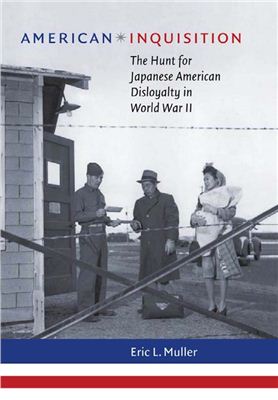The University of North Carolina Press, 2007. - 214 p.
ISBN: 978-0-8078-3173-1
Review
"Excellent evidence-driven research. . . . [A] valuable contribution."
-American Studies
"[A] clearly written history. . . . A close and nuanced reading of the hunt for Japanese American disloyalty during World War II. . . . Points to new areas of profitable research for historians of Japanese America."
- Joual of American Ethnic History
"Muller once again does an exemplary job of unearthing new archival materials and shedding a substantial amount of light on a well-studied topic. . . . Fascinating."
-American Historical Review
"An excellent study of the mid-level agencies' messy job at evaluating the loyalty of Japanese Americans, and concludes by contextualizing this case within past and present govemental evaluations of loyalty."
— Weste Historical Quarterly
"The author places this work within the broader context of history and ties into the development of subsequent loyalty programs to ferret out communists during the Cold War. . . . Recommended."
— Choice
"Insightful."
— Arkansas Historical Quarterly
"[A] good book on an unexplored dimension of a sorry chapter in American history."
— Joual of American History
Combining intensive archival research and brilliant analysis, Eric Muller gives us another example of bad news from the good war.
—Roger Daniels, University of Cincinnati, Emeritus, and author of Prisoners Without Trial: Japanese Americans in World War II
Product Description
When the U.S. govement forced 70,000 American citizens of Japanese ancestry into intement camps in 1942, it created administrative tribunals to pass judgment on who was loyal and who was disloyal. Muller relates the untold story of exactly how military and civilian bureaucrats judged these tens of thousands of American citizens during wartime. This is the only study of the Japanese American intement to examine the complex inner workings of the most draconian system of loyalty screening that the American govement has ever deployed against its own citizens. At a time when our nation again finds itself beset by worries about an "enemy within" considered identifiable by race or religion, this volume offers crucial lessons from a recent and disastrous history.
ISBN: 978-0-8078-3173-1
Review
"Excellent evidence-driven research. . . . [A] valuable contribution."
-American Studies
"[A] clearly written history. . . . A close and nuanced reading of the hunt for Japanese American disloyalty during World War II. . . . Points to new areas of profitable research for historians of Japanese America."
- Joual of American Ethnic History
"Muller once again does an exemplary job of unearthing new archival materials and shedding a substantial amount of light on a well-studied topic. . . . Fascinating."
-American Historical Review
"An excellent study of the mid-level agencies' messy job at evaluating the loyalty of Japanese Americans, and concludes by contextualizing this case within past and present govemental evaluations of loyalty."
— Weste Historical Quarterly
"The author places this work within the broader context of history and ties into the development of subsequent loyalty programs to ferret out communists during the Cold War. . . . Recommended."
— Choice
"Insightful."
— Arkansas Historical Quarterly
"[A] good book on an unexplored dimension of a sorry chapter in American history."
— Joual of American History
Combining intensive archival research and brilliant analysis, Eric Muller gives us another example of bad news from the good war.
—Roger Daniels, University of Cincinnati, Emeritus, and author of Prisoners Without Trial: Japanese Americans in World War II
Product Description
When the U.S. govement forced 70,000 American citizens of Japanese ancestry into intement camps in 1942, it created administrative tribunals to pass judgment on who was loyal and who was disloyal. Muller relates the untold story of exactly how military and civilian bureaucrats judged these tens of thousands of American citizens during wartime. This is the only study of the Japanese American intement to examine the complex inner workings of the most draconian system of loyalty screening that the American govement has ever deployed against its own citizens. At a time when our nation again finds itself beset by worries about an "enemy within" considered identifiable by race or religion, this volume offers crucial lessons from a recent and disastrous history.

